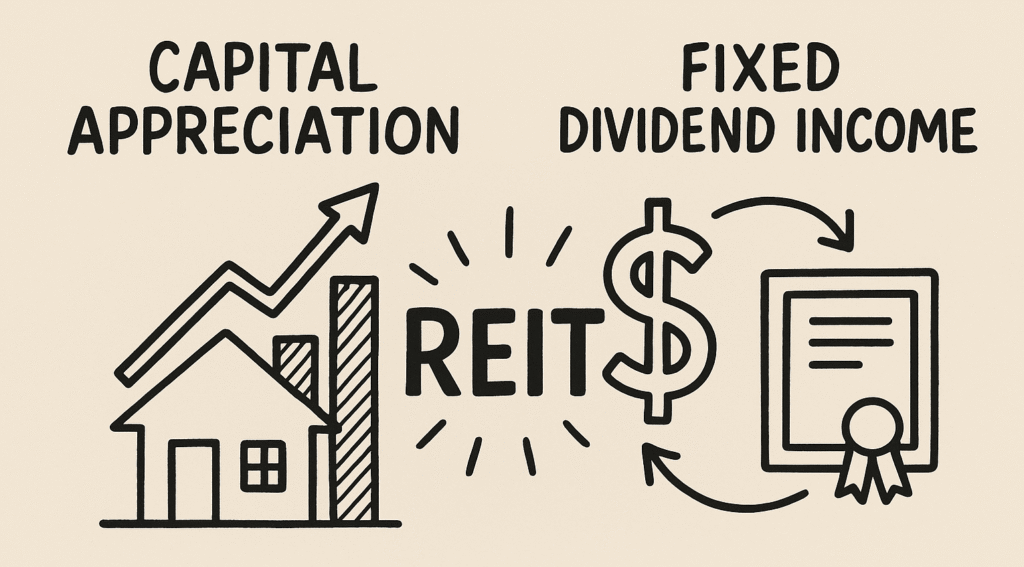Real Estate Investment Trusts (REITs) are transforming how Indians invest in real estate. Offering easy access to commercial properties via the stock market, REITs deliver steady dividends and growth potential. If you’re searching for “best REITs in India” or “REITs for dividend income,” this SEO-optimized guide covers the top listed REITs, their benefits, and why they’re a smart pick for 2025.
What Are REITs and Why Invest in India?
REITs are companies that own income-generating properties like offices and malls, trading like stocks on the NSE/BSE. Regulated by SEBI, they must distribute 90% of taxable income as dividends, making them perfect for passive income seekers.

Why Choose REITs?
- Liquidity: Buy/sell units easily.
- Diversification: Spread risk across properties.
- Low Entry: Invest with just ₹100-500 per unit.
For those Googling “REIT investment in India,” REITs offer real estate exposure without the hassle of ownership.
Top Listed REITs in India 2025
Four major REITs dominate India’s stock market, focusing on high-demand commercial assets in cities like Mumbai, Bengaluru, and Delhi NCR.
| REIT Name | Sponsor | Focus | Listing Year | Key Locations |
|---|---|---|---|---|
| Embassy Office Parks REIT | Embassy & Blackstone | Office spaces | 2019 | Bengaluru, Mumbai, Pune |
| Mindspace Business Parks REIT | K Raheja & Blackstone | IT parks, offices | 2020 | Mumbai, Hyderabad, Chennai |
| Brookfield India REIT | Brookfield | Commercial offices | 2021 | Mumbai, Delhi NCR, Kolkata |
| Nexus Select Trust REIT | Blackstone | Retail malls | 2023 | 14 cities in India |
These REITs manage premium portfolios with tenants like global tech giants, ensuring stable returns. Check tickers like EMBASSY or MINDSPACE on NSE/BSE for updates.
Capital Appreciation and Dividend Income: Why REITs Shine in India
Real Estate Investment Trusts (REITs) in India are a powerhouse for investors, blending capital appreciation with steady dividend income in the booming real estate market. Here’s why they’re a top pick for 2025:
- Rising Property Values: Embassy REIT capitalizes on Bengaluru’s tech hub demand, driving unit price growth as commercial properties soar.
- Portfolio Expansion: Brookfield’s strategic acquisitions boost net asset value, fueling capital gains. Embassy REIT units, for example, have surged over 50% since their IPO.
- High Dividend Yields: With 6-8% annual returns, REITs like Mindspace outperform fixed deposits, distributing 90% of cash flows quarterly.
- Regular Passive Income: Nexus REIT’s retail focus ensures consistent dividends, ideal for those seeking “dividend income from REITs.”
- Inflation Protection: Rental escalations keep dividends growing, safeguarding your income.
- Diversification and Accessibility: Gain real estate exposure without buying property, with units as low as ₹100-500. Professional management handles operations, making REITs perfect for NRIs and locals searching for “high dividend REITs in India.”
With India’s GDP growing at 7% in 2025, REITs offer long-term capital appreciation and reliable income, making them a must-have for savvy investors.
Risks to Watch
- Interest Rates: Higher rates may impact dividends.
- Market Swings: Unit prices can dip in downturns.
- Sector Risks: Office REITs face remote work challenges.
Diversify and consult a financial advisor.
How to Start Investing in REITs
- Open a demat account (e.g., Zerodha).
- Buy REIT units on NSE/BSE.
- Track dividends and NAV via apps like Moneycontrol.
Search “how to invest in REITs” for beginner-friendly tips.
Conclusion: REITs for a Winning Portfolio
REITs like Embassy, Mindspace, Brookfield, and Nexus offer 6-8% dividends and strong growth potential, making them a top pick for 2025. Tap into India’s real estate boom with ease. Invest smart, stay informed, and grow your wealth!
Disclaimer: Past performance isn’t a guarantee of future results. I am not a SEBI-registered Research Analyst. Consult a professional before investing.

